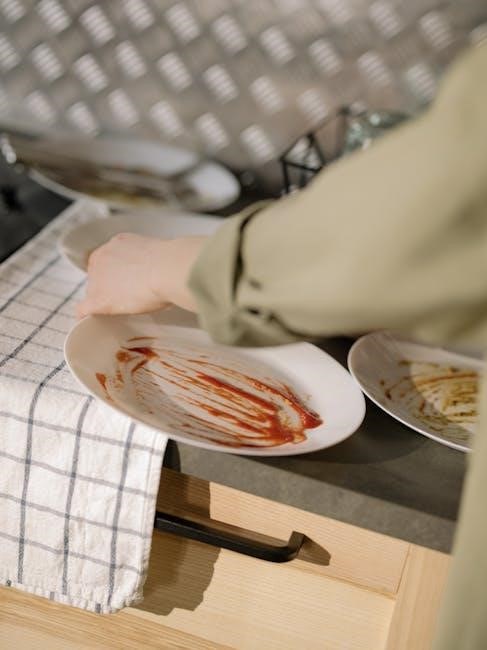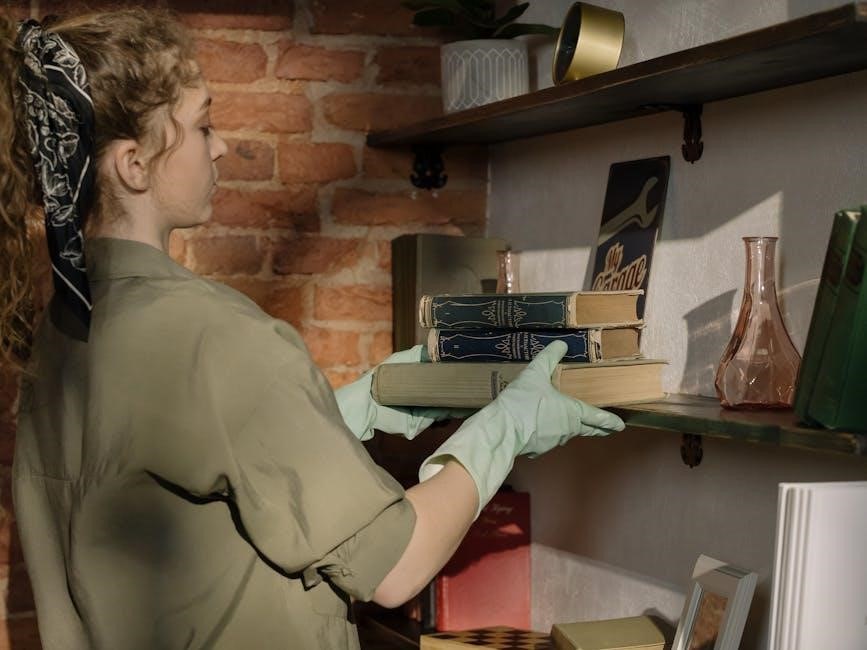“How to Keep House While Drowning” by KC Davis offers a compassionate guide for managing household tasks amid overwhelm. It emphasizes self-compassion and practical strategies for creating a functional home environment, particularly for those facing mental health challenges or neurodivergent individuals. The book provides gentle, achievable steps to reduce shame and build sustainable routines, making it a valuable resource for anyone struggling to balance cleaning and life.
Overview of the Book and Its Purpose
“How to Keep House While Drowning” by KC Davis is a transformative guide designed for individuals struggling to maintain their living spaces due to overwhelm, mental health challenges, or neurodivergence. The book shifts the focus from perfectionism to self-compassion, offering practical, achievable strategies for creating a functional and comfortable home. It emphasizes sustainable routines and gentle skill-building, making it accessible to those who feel defeated by traditional cleaning methods. Davis’s approach is rooted in empathy and understanding, providing tools to reduce shame and foster a healthier relationship with housekeeping. The book is particularly tailored for those who need a kinder, more flexible approach to managing their environment without feeling guilty or inadequate.
The Author’s Approach to Cleaning and Organizing
Author KC Davis presents a unique and compassionate approach to cleaning and organizing in “How to Keep House While Drowning”. Rather than advocating for perfection or strict routines, Davis emphasizes self-compassion and adaptability. Her method focuses on breaking tasks into small, manageable steps, allowing individuals to build skills gradually without feeling overwhelmed. Davis’s approach is particularly suited for those with mental health challenges, chronic illness, or neurodivergent brains, offering a judgment-free framework for creating a functional and comforting home environment. By prioritizing emotional well-being over spotlessness, Davis provides readers with practical, flexible tools to reclaim control of their spaces and reduce feelings of guilt or inadequacy.

Key Principles for Managing Household Chaos
The book introduces key principles such as gentle skill-building, task prioritization, and boundary-setting to manage household chaos effectively, focusing on reducing overwhelm and shame.
The Importance of Self-Compassion in Cleaning
Self-compassion is a cornerstone of KC Davis’s approach, emphasizing kindness over perfection. By acknowledging that cleaning is hard and progress is slow, individuals can replace shame with understanding. The book encourages embracing imperfection and celebrating small wins, fostering a healthier relationship with household tasks. This mindset allows overwhelmed individuals to begin where they are, rather than expecting an idealized version of cleanliness. By prioritizing emotional well-being, self-compassion transforms cleaning from a source of guilt into a manageable, even empowering, process. This gentle perspective helps readers break the cycle of self-criticism and create a more sustainable, loving approach to home care.
Setting Boundaries for a Sustainable Routine

Establishing boundaries is crucial for maintaining a manageable cleaning routine without burnout. KC Davis advocates for creating realistic expectations and prioritizing tasks based on necessity and energy levels. By setting clear limits, individuals can avoid overcommitting and focus on what truly matters. This approach encourages breaking tasks into smaller, achievable steps and embracing the concept of “good enough.” Boundaries also involve learning to say no to perfectionism and unrealistic standards. By doing so, individuals can cultivate a routine that aligns with their capacity, fostering consistency and reducing feelings of overwhelm. These boundaries not only protect time and energy but also promote a healthier relationship with household responsibilities, making sustainability possible.

Practical Strategies for Overwhelmed Individuals
Practical strategies include breaking tasks into micro-steps, using visual schedules, and embracing flexibility. These techniques help overwhelmed individuals create manageable routines without pressure, fostering a sense of control.
Gentle Skill-Building for Chores and Organization

The book emphasizes gentle skill-building as a foundational approach to managing chores and organization. It encourages starting with small, manageable tasks and gradually building habits over time. This method avoids overwhelming readers with strict rules or unrealistic expectations. By focusing on progress rather than perfection, individuals can develop confidence and consistency. The author suggests using affirmations and self-compassionate language to reframe cleaning as a form of self-care. Practical tips include creating visual schedules, breaking tasks into micro-steps, and celebrating small achievements. This approach is particularly beneficial for those with mental health challenges or neurodivergent individuals, as it fosters a sense of control and reduces feelings of overwhelm.
How to Prioritize Tasks Without Feeling Guilty
KC Davis advocates for a guilt-free approach to prioritizing tasks, emphasizing self-compassion and realistic expectations. The book teaches readers to identify essential tasks and delegate or postpone less critical ones. By focusing on “good enough” rather than perfection, individuals can reduce overwhelm and build a sustainable routine. Davis suggests creating a priority list based on immediate needs and long-term goals, allowing flexibility for unpredictable days. This method encourages celebrating small wins and viewing chores as acts of self-care. By reframing tasks as choices rather than obligations, readers can cultivate a healthier relationship with household responsibilities and reduce feelings of guilt or failure.

Mental Health and Cleaning
Cleaning’s impact on mental health is profound, reducing anxiety and depression. KC Davis offers neurodivergent-friendly strategies, transforming chores into therapeutic routines that promote emotional well-being.
Addressing Anxiety and Depression Through Cleaning Routines
Cleaning routines can serve as a therapeutic tool for managing anxiety and depression. By breaking tasks into small, achievable steps, individuals can regain a sense of control and purpose. KC Davis emphasizes the importance of self-compassion, encouraging gentle progress over perfection. The book highlights how creating structure through cleaning can alleviate feelings of overwhelm, providing a tangible way to cope with emotional struggles. For neurodivergent individuals, these routines can be particularly comforting, offering a sense of predictability in chaotic times. By reframing cleaning as an act of self-care, the book empowers readers to heal and find balance in their lives.
Neurodivergent-Friendly Approaches to Housekeeping
KC Davis’s approach to housekeeping is uniquely tailored for neurodivergent individuals, offering strategies that accommodate sensory sensitivities and cognitive challenges. The book emphasizes the importance of flexibility, allowing readers to adapt routines to their specific needs. By focusing on functionality over aesthetics, Davis helps neurodivergent individuals create a living space that supports their well-being. Techniques such as gentle skill-building and task prioritization are designed to reduce overwhelm and foster independence. This approach acknowledges the unique experiences of neurodivergent individuals, providing practical tools to manage household responsibilities without triggering anxiety or stress, making it a vital resource for those seeking a more inclusive and compassionate cleaning guide.

“How to Keep House While Drowning” empowers readers to implement practical, sustainable cleaning routines. Many have shared success stories, like Amanda, who found the book life-changing, helping her create a balanced home environment and reduce stress. By focusing on gentle strategies and self-compassion, the book serves as a guide for anyone seeking to move from overwhelm to harmony in their daily lives.
Success Stories and Testimonials from Readers
Readers of “How to Keep House While Drowning” have shared inspiring stories of transformation. Many, like Amanda, describe the book as life-changing, helping them shift from overwhelm to balance. One reader mentioned how the gentle approach reduced their anxiety, while another credited the book with helping them establish sustainable routines. KC Davis’s emphasis on self-compassion resonated deeply, empowering individuals to redefine their relationship with cleaning. Testimonials highlight how the book’s practical strategies have fostered a sense of control and calm in chaotic lives. These success stories underscore the book’s impact in creating functional, stress-free homes for those struggling with mental health or neurodivergent challenges.
How to Implement the Book’s Principles in Daily Life
Implementing the principles from “How to Keep House While Drowning” involves creating a balanced and compassionate approach to housekeeping. Start by assessing your current situation and identifying areas that cause stress or overwhelm. Break down tasks into smaller, manageable steps, focusing on progress rather than perfection. Set realistic goals and celebrate small achievements to maintain motivation. Allocate specific times for cleaning and organizing, ensuring it fits seamlessly into your daily routine without causing burnout. Prioritize tasks based on urgency and importance, and learn to say no to non-essential activities. Track your progress through a journal or checklist to stay motivated and adaptable. By embracing flexibility and self-compassion, you can integrate these principles into your daily life, fostering a sense of control and calm amidst chaos.
